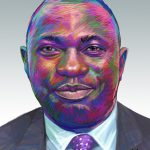May 26, (THEWILL)- The President Bola Tinubu administration came into office on May 29, 2023, with great optimism starting off with the implementation of two tough but necessary economic decisions – cancellations of the subsidy on petrol and multiple foreign exchange rates. Though these reforms have worsened the economic situation in the short and midterm, they are expected to catalyse economic growth in the long-term according to overall consensus by both Nigeria and global economists.
When President Tinubu on June 15, 2023, inaugurated the National Economic Council (NEC) advisory body, comprising the Governors of the 36 States, Central Bank of Nigeria (CBN) Governor and other stakeholders, at the State House, he listed eight priority areas for urgent attention and called for collective frameworks that will stimulate a buoyant economy that meets the needs of the poor and vulnerable.
The areas of focus are on security, economy, jobs, agriculture, infrastructure, monetary policy and fuel subsidy.

Almost one year down the line of the President’s four-year tenure, his Ministers have heeded his call to publicise their achievements or, better still, to tell Nigerians whether they have justified their appointments by pushing policy initiatives towards realising the 7-point agenda. THEWILL notes that the consensus expectation is that President Tinubu will effect changes to his cabinet in the coming days.
Whilst the Tinubu administration has three more years to deliver on its mandate, our cover story identifies 15 Ministers amongst the 45 appointees, who are showing capacity and understanding of their roles and appear to be shining stars of this administration thus far. We dub them The Performers.
They are Minister of Aviation and Aerospace Development, Festus Keyamo, SAN; Minister of Works, David Umahi; Minister of Internal Affairs, Olubunmi Tunji-Ojo; Minister of Communications, Innovations and Digital Economy, Bosun Tijani; Minister of Solid Mineral Resources, Oladele Alake; Minister of the Federal Capital Territory, Nyesom Wike; Minister of Defence, Mohammed Badaru Abubakar; Minister of Health, Mohammed Ali Pate and Minister of Justice and Attorney General of the Federation, Lateef Fagbemi.
Others are Minister of Trade and Investment, Doris Uzoka-Anite; Minister of Labour and Employment, Nkiriuka Onyejeocha; Minister of Sports, John Enoh; Minister of Foreign Affairs, Yusuf Tuggar; Minister of Information and National Orientation, Muhammed Idris and Minister of Arts, Culture and Creative Economy, Hannatu Musawa.
Minister of Aviation and Aerospace Development, Festus Keyamo, SAN
 The Minister of Aviation and Aerospace Development, Festus Keyamo, SAN had said that his portfolio upon assumption of office will deal with five key areas important to reposition the sector for effective service delivery and make Nigerian airlines compete with their international counterparts.
The Minister of Aviation and Aerospace Development, Festus Keyamo, SAN had said that his portfolio upon assumption of office will deal with five key areas important to reposition the sector for effective service delivery and make Nigerian airlines compete with their international counterparts.
The minister outlined the priority areas as ensuring the safety of passengers; improving infrastructure in terms of the physical buildings and navigation equipment; support the growth and survival of local operators; human capital development through training; and retraining initiatives.
Two weeks into his tenure, he successfully resolved the protracted land dispute with the settlers that had stalled the commencement of the construction of the Abuja Second Runway, despite an initial deposit made by the previous administration over a year before the commencement of the current administration. Construction work has since commenced at the site.
Within a month in office, the minister ordered all international airlines to relocate to the new international terminal in Lagos, making it fully operational and found immediate solutions to the design flaws in the facility that had previously rendered the terminal unusable for many international flights. He also ensured the swift repair and reactivation of Lagos’ Second Runway (18R), which had been out of service for nearly a year before assuming office and left only one runway in use for the busiest airport in the country.
Under Kayemo’s watch, the controversial Nigeria Air Project, a poorly implemented project by his predecessor, Hadi Sirika, was suspended to rescue the country from an appalling deal with Ethiopian Airlines.
Two most significant achievements recorded by Keyamo since his assumption of office are the successful return of a Nigerian flag carrier to the highly lucrative London, United Kingdom route since 2017. He broke the longstanding monopoly of foreign airlines on the UK-Nigeria route by actively engaging with the UK authorities to grant Air Peace, a local airline, reciprocal operating rights under Nigeria’s Bilateral Air Service Agreement with the UK. This move led to a significant reduction in fares on this route for Nigerians after Air Peace launched its inaugural daily flights in March this year.
The second is the restoration of flights between Nigeria and the UAE through the diplomatic effort of President Tinubu. Keyamo successfully coordinated with UAE authorities, resulting in the resumption of Emirates flights by October 1, 2024. Air Peace is also expected to relaunch its flights into Dubai this year as well.
In a similar feat, Keyamo last week successfully revived the resumption of the long-dormant cargo flight operations between Nigeria and Saudi Arabia as the United States-Nigeria Open Skies Air Transport Agreement entered into force, which is a huge step that allows Nigerian airlines to operate into any city in that country.
In partnership with the immigration service, the minister expedited and supervised the remodeling of the Arrival Hall of Wing E at Lagos International Airport into a brand-new facility through a Public-Private Partnership and also worked closely with the Central Bank of Nigeria to resolve and clear longstanding backlog of trapped funds for foreign airlines.
This month, Keyamo also obtained FEC approval to boost revenue and prevent losses at FAAN facilities nationwide by requiring all VIPs to pay access fees at all the Airport toll gates, thereby departing from a tradition that existed for decades that gave VIPs exemptions at our airports.
Keyamo is also in high level talks with Access Bank Group to reconstruct the old international airports in Lagos and Port Harcourt under the bank’s CSR.
Minister of Interior, Olubunmi Tunji-Ojo
As Minister of Interior, Tunji-Ojo is leaving a legacy that will not only impact efficiency and leadership but also regain public confidence in public service.
Within two weeks of assuming office, he resolved a backlog of 204,000 passport applications, demonstrating his ability to deliver efficient service to citizens.
He has also introduced user-friendly e-platforms for visa applications, enhanced e-passport facilities at key Nigerian embassies, and advocated for fair compensation for paramilitary officers. His collaborative efforts have led to the release of 4,000 inmates from correctional centers, reflecting his commitment to rehabilitation and social justice.
Minister of Works, David Umahi
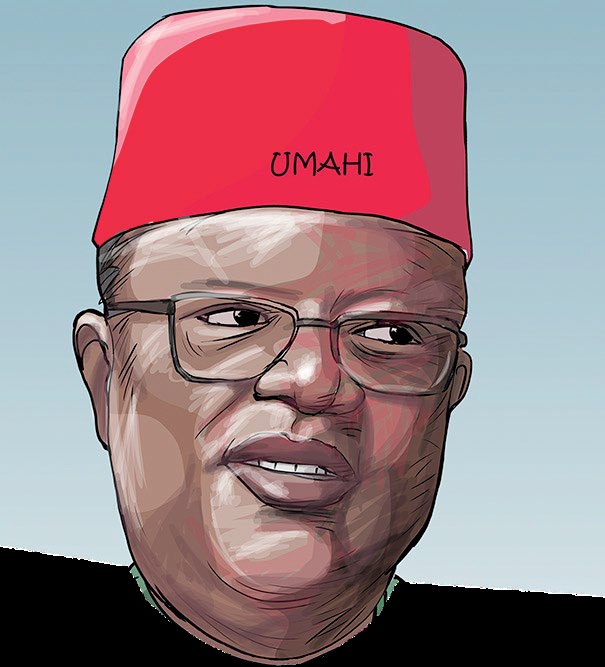 Minister of Works, David Umahi, Is visibly one of the top performing ministers as his preference for concrete pavements over asphalt in roads construction across the country has stood him out, justifying his view that “You cannot put asphalt in water but you can put concrete in water.” Always visible at several road junctions across the country inspecting projects, his display of knowledge of the terrain, especially his ability to persuasively quote figures, to the chagrin of many contractors, is a demonstration of his depth of knowledge.
Minister of Works, David Umahi, Is visibly one of the top performing ministers as his preference for concrete pavements over asphalt in roads construction across the country has stood him out, justifying his view that “You cannot put asphalt in water but you can put concrete in water.” Always visible at several road junctions across the country inspecting projects, his display of knowledge of the terrain, especially his ability to persuasively quote figures, to the chagrin of many contractors, is a demonstration of his depth of knowledge.
An outstanding builder, his signature is clearly visible on the transformation work on the newly-rehabilitated Third Mainland Bridge in Lagos as he is currently transforming the long abandoned Abuja-Kaduna-Kano highway into a priority corridor, even as it appears that he is learning very fast the politics of roads construction in Nigeria with his handling of the controversial Lagos-Calabar Coastal Highway.
Oladele Alake, Minister of Solid Minerals Development
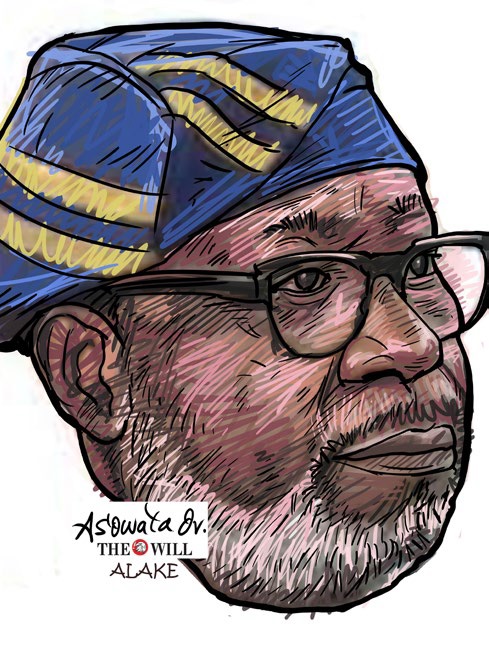 Minister of Solid Minerals Development, Dele Alake, has said his ministry is critical to the Bola Tinubu Administration’s goal to transition Nigeria from a mono-cultural to a diversified economy through eight prioritised areas.
Minister of Solid Minerals Development, Dele Alake, has said his ministry is critical to the Bola Tinubu Administration’s goal to transition Nigeria from a mono-cultural to a diversified economy through eight prioritised areas.
Sounding upbeat at the Ministerial Briefing held last Thursday, he said that a global upsurge in energy transition has led to the focus on green energy, which relies on critical minerals that Nigeria possesses in commercial quantities.
According to the minister, the critical minerals will provide opportunities for the sector to contribute more to Nigeria’s Gross Domestic Product and develop its local economy. Accordingly, Nigeria has been showcasing the potential of its minerals, which has been attracting the interest of foreign investors like Glencore Group visiting Nigeria to seek more information for business; the ministry has unveiled the Nigerian Minerals Resource Decision Support System Software, a one-stop shop for investors seeking geoscience data and other credible information to make informed decisions. The Nigerian Solid Minerals Company has been set up through public/private partnership with 25 per cent as government share; 25 per cent Nigerian public and 50 per cent share for private investors.
Strategically, 1,619 titles and 900 dormant mining licences were revoked from operators who failed to meet their obligations to government, while the Community Development Agreement aimed at fostering harmony between mining companies and host communities has been reworked and the Mining Marshal Corps has been established and deployed across the 36 states and the Federal Capital Territory.
Nyesom Wike, Minister of the Federal Capital Territory
 Declaring: “We have been in office in only nine months and you do not expect us to solve the entire problems of Nigeria once,” Wike announced the commissioning of a 120 kilometre road within the six area councils and listed the implementation of the FCT service commission, the inclusion of the women’s secretariat in the FCT, which now has a mandate Secretary, and the exit of the FCTA from the Treasury Single Account to pave the way for access to the FCT’s internally generated revenue for the execution of projects.
Declaring: “We have been in office in only nine months and you do not expect us to solve the entire problems of Nigeria once,” Wike announced the commissioning of a 120 kilometre road within the six area councils and listed the implementation of the FCT service commission, the inclusion of the women’s secretariat in the FCT, which now has a mandate Secretary, and the exit of the FCTA from the Treasury Single Account to pave the way for access to the FCT’s internally generated revenue for the execution of projects.
Other areas of recorded success, he said, include improved security dealing with provision of security vehicles, construction of roads, Rehabilitation of the Abuja light rail project, rehabilitation of schools across the FCT, improved roads and critical infrastructure.
Looking ahead, he said, “In our next budget, we want to build a ‘Renewed Hope City’. This is for affordable houses, not for the big men. We are going to provide infrastructure, build and allocate houses to the poor. We have in our mind to build 10,000 houses for the poor.”
Minister of Defence, Mohammed Badaru Abubakar
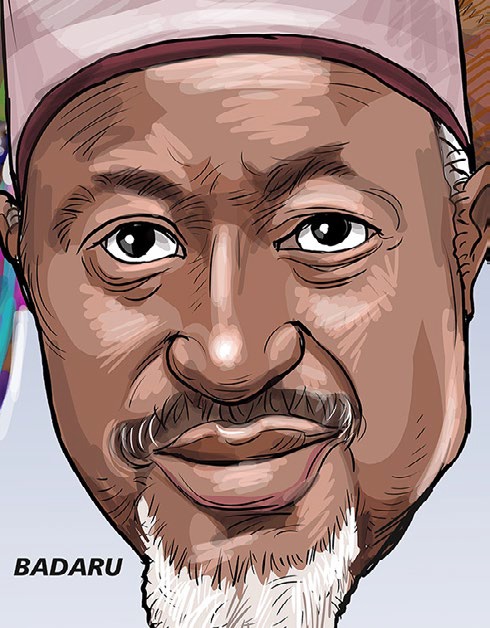 According to the Minister of Defence, Mohammed Badaru Abubakar, insecurity has been leashed in a bid to eliminate it. He said that in line with the President’s Renewed Hope Agenda, the Ministry of Defence has been able to bring all security agencies together and create a synergy among the Police, the Armed Forces, the Nigeria Security and Civil Defence Corps, and the office of the National Security Adviser.
According to the Minister of Defence, Mohammed Badaru Abubakar, insecurity has been leashed in a bid to eliminate it. He said that in line with the President’s Renewed Hope Agenda, the Ministry of Defence has been able to bring all security agencies together and create a synergy among the Police, the Armed Forces, the Nigeria Security and Civil Defence Corps, and the office of the National Security Adviser.
As a result, 3,900 bandits and insurgents have been neutralised, 7,000 arrested and 4,431 victims rescued. Measures, he said, have been taken to improve crude oil production through the destruction of 3,051 illegal refineries and depots, 2,279 boats, 3,900 storage facilities and vessels arrested.
Internally, the ministry is collaborating with the Ministry Interior and Humanitarian Affairs, Disaster Management and Social Development to involve Nigerians in intelligence gathering for the security agencies. Externally, the ministry has sustained and strengthened collaboration with Cameroon and the Benin Republic on security matters. With the signing of the Defence Industry Corporation of Nigeria, DICON bill, the country is embarking on the production of arms and ammunition to fight insurgency and banditry with 13 companies about to start in the country. “In no distant future, we will end insecurity problems in the country,” Abubakar concluded.
Minister of Justice and Attorney-General of the Federation, Lateef Fagbemi, SAN
 The Minister of Justice and Attorney-General of the Federation, Lateef Fagbemi, SAN, declared on Friday that the Federal Government secured 166 criminal convictions in the past year. He made the disclosure while presenting his scorecard at the ongoing Ministering Sectoral Updates in Abuja, the Federal Capital Territory, FCT.
The Minister of Justice and Attorney-General of the Federation, Lateef Fagbemi, SAN, declared on Friday that the Federal Government secured 166 criminal convictions in the past year. He made the disclosure while presenting his scorecard at the ongoing Ministering Sectoral Updates in Abuja, the Federal Capital Territory, FCT.
Fagbemi said the ministry, hand in hand with relevant security and law enforcement agencies, such as the Legal Aid Council and the National Human Rights Commission, developed a framework for joint investigation and collaboration to facilitate successful prosecution of criminal and civil cases, leading to securing “166 convictions of criminal cases out of which 87 convictions were for terrorism and 13 for terrorism financing. The percentage of terrorism cases initiated and terrorism cases concluded within the period has been significant,” he revealed.
He disclosed that 625 cases were initiated against the President, the Federal Government of Nigeria and its agencies before states, federal and ECOWAS courts within the same period. He said the welfare of Judges has improved and “for the first time, we have had a full complement of 21 Justices at the Supreme Court and wages have increased. Allocation has been on the upsurge.”
Looking ahead, the minister said President Bola Tinubu’s government was operating on the rule of law and justice and “no one will be held outside the laws of the country”, because, “You don’t rationalise justice, you dispense it. If people deserve to be released, you release them.”
Minister of Communications, Innovation and Digital Economy, Bosun Tijani
The minister has concentrated on two major areas with the president’s approval. These areas are broadband infrastructure and capital development.
Since his appointment, the minister has launched a Special Purpose Vehicle (SPV) that will support the delivery of an additional 90,000km of fibre-optic cable to complement Nigeria’s existing connectivity infrastructure and deliver a stronger national backbone for universal access to the internet across the country. This according to Mr. Tijani will increase the nation’s connectivity backbone to a minimum of 125,000km from the current coverage of about 35,000km.
Another significant move by the minister is the conversion of a previously abandoned prime federal government owned property in San Francisco, California, United States to a Nigerian Digital Technology Exchange Programme Hub (Nigeria Startup House). The Silicon Valley is the global center for technology and innovation. The Nigerian Startup House will be managed by a consortium of Nigerian digital technology companies who will provide non-public funding for the operations of the Startup House.
Minister of Health, Ali Pate
The Minister of Health, Ali Pate, stated that efforts have been made through the National Agency for Food and Drug Administration and Control, NAFDAC, to reduce the circulation of fake drugs, disclosing that, “the prevalence of fake drugs is now less than 10 percent.” He said that though such efforts were still not good enough, it was a good departure from the past.
Another achievement of the Ministry of Health has been its ability to contain the spread of infectious diseases such as meningitis, Lassa fever and malaria.
Though presently witnessing a large exodus of doctors, midwives and nurses from our health facilities, the minister confirmed the recruitment of 2,497 replacements within the last eight months to bridge the manpower shortage in the health sector. He said an additional 1,400 health facilities now have Skilled Birth Attendants to assist in deliveries at the health facilities.
According to him the FG will be releasing N50 billion as the first tranche of the Basic Healthcare Fund, a significant increase from N25bn allocated in 2022.
“This infusion of funds will breathe new life into our primary healthcare facilities, ensuring that quality care is accessible to all citizens,” Pate said.
Minister of Industry, Trade and Investment, Doris Uzoka-Anite
 Minister of Industry, Trade, and Investment, Doris Uzoka-Anite, has been instrumental in facilitating several international and domestic investments worth over $30 billion into the country’s economy and across various sectors, since her appointment a year ago. As a major participant in Nigeria’s various bilateral engagements, the minister has sealed many partnership opportunities for Nigerian trade, such as the $14bn worth of FDI inflow to Nigeria during the G20 summit in India and another $10 billion in investment commitments for the oil and gas sector.
Minister of Industry, Trade, and Investment, Doris Uzoka-Anite, has been instrumental in facilitating several international and domestic investments worth over $30 billion into the country’s economy and across various sectors, since her appointment a year ago. As a major participant in Nigeria’s various bilateral engagements, the minister has sealed many partnership opportunities for Nigerian trade, such as the $14bn worth of FDI inflow to Nigeria during the G20 summit in India and another $10 billion in investment commitments for the oil and gas sector.
Uzoka-Anite also succeeded in fostering collaborative efforts between her ministry, Nigeria Customs Service and the Central Bank of Nigeria to automate the export permit process for increased transparency in ensuring that exports proceeds are duly repatriated back to the country.
Fueling economic growth and transforming lives, the Federal Government, through the Federal Ministry of Industry, Trade and Investment and Bank of Industry, is disbursing N50,000 grants to nano businesses across the 774 LGAs of the country via the Presidential Conditional Grant Scheme (PCGS). This initiative supports women, youth, the elderly, and the physically challenged in various sectors like trading, artisanship, food services, and more.
Minister of State, Labour and Employment, Nkiruka Onyejeocha
Under her watch as Minister of State, Labour and Employment, Nkiruka Onyejeocha, was instrumental to the launch of the Labour Employment Enhancement Programme (LEEP) to provide the Nigerian workforce with the essential tools and opportunities to succeed in the digital era. Her Special Adviser on Media, Gabriel Emameh, disclosed that LEEP has the vision to train and equip 2.5 million people as it is targeted at zero hunger, zero poverty, economic growth, and decent jobs through six strategic initiatives.
As the first female minister in the ministry’s history, Onyejeocha has exhibited pragmatism in service and she has successfully used the Presidential Compressed Natural Gas Initiative stakeholders’ engagement to mobilise skilled workers. The minister succeeded in forging a groundbreaking partnership between the ministry and PI-CNG initiators with the aim of bringing together technicians and unions to create over 25,000 jobs for Nigerian technicians across the country. She has also been instrumental to the on-going negotiations with labour on minimum wage for workers.
Minister of Sports Development, John Enoh
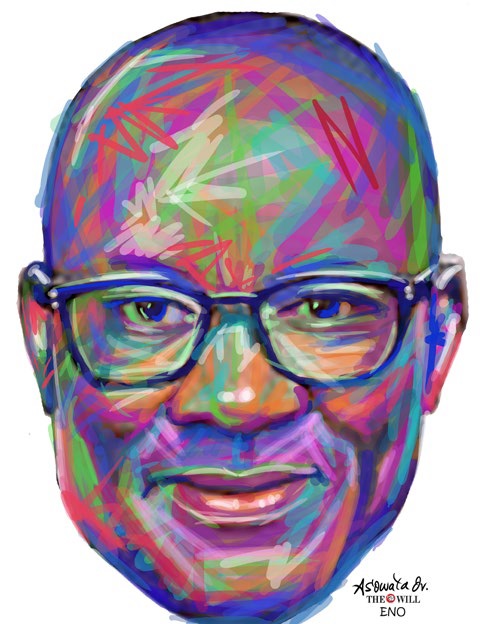 Minister of Sports Development, John Enoh, is the 36th Minister of Sports. His achievements, according to his media aide, Diana-Mary Nsan, include successes recorded across various sporting events, including the African Cup of Nations, the All African Games and the World Relay Championships in the Bahamas.
Minister of Sports Development, John Enoh, is the 36th Minister of Sports. His achievements, according to his media aide, Diana-Mary Nsan, include successes recorded across various sporting events, including the African Cup of Nations, the All African Games and the World Relay Championships in the Bahamas.
The positive strides made by Nigerian athletes on the international stage, showcasing the nation’s prowess and determination in the world of sports were the results of his dedication and commitment as well as his encouragement to the athletes.
The minister, who recently outlined the vision of his ministry, to increase private investments in the sports industry as well as advance sports for development and development of sports, revealed that the industry has undergone a significant facelift, ushering in a new era of growth and opportunity, with the Ministry of Sports now standing alone from youth development.
Minister of Foreign Affairs, Yusuf Tuggar
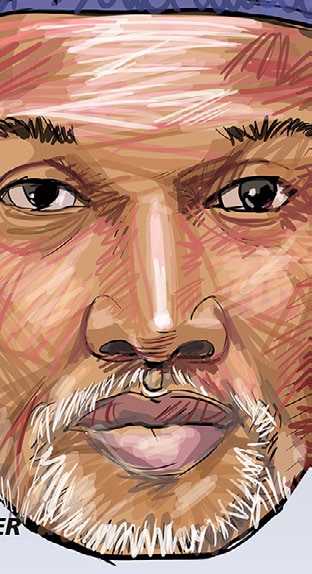 Minister of Foreign Affairs, Yusuf Tuggar, is a major figure in the present administration and he is leading the implementation of President Bola Tinubu’s new foreign policy initiative, the “4D Doctrine,” which focuses on Demography, Development, Diaspora and Democracy with a significant focus on development, specifically on renewing and strengthening bilateral relations, facilitating socio-economic growth, and promoting Nigeria’s sovereignty, regional integrity, and national interests.
Minister of Foreign Affairs, Yusuf Tuggar, is a major figure in the present administration and he is leading the implementation of President Bola Tinubu’s new foreign policy initiative, the “4D Doctrine,” which focuses on Demography, Development, Diaspora and Democracy with a significant focus on development, specifically on renewing and strengthening bilateral relations, facilitating socio-economic growth, and promoting Nigeria’s sovereignty, regional integrity, and national interests.
As Nigeria’s former Ambassador to Germany for seven years, Tuggar facilitated the state visit of German Chancellor Angela Merkel to Nigeria, played a major role during the 23rd session of the UN Framework Convention on Climate Change, and was behind the repatriation of lost artifacts from the German Government back to Nigeria, especially the Benin artefacts. Last week, two more significant artefacts were repatriated to the Oba of Benin from Germany.
Minister of Arts, Culture and Creative Economy, Hannatu Musawa
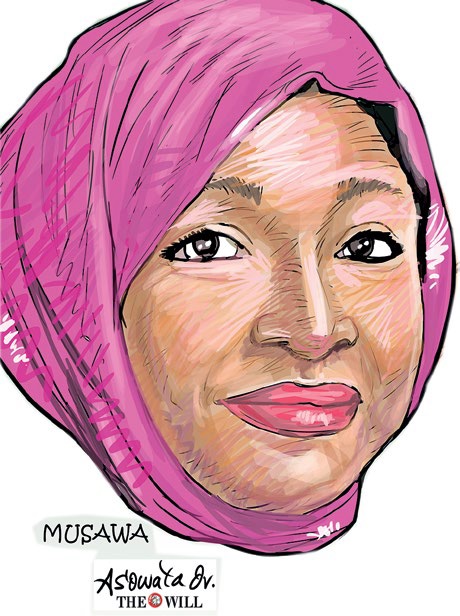 Minister of Arts, Culture and Creative Economy- Hannatu Musawa, is behind the groundbreaking partnership with the African Development Bank (AfDB) that led to the launch of the $617 million Investment in Digital and Creative Enterprises (IDICE) fund.
Minister of Arts, Culture and Creative Economy- Hannatu Musawa, is behind the groundbreaking partnership with the African Development Bank (AfDB) that led to the launch of the $617 million Investment in Digital and Creative Enterprises (IDICE) fund.
Described as a significant milestone for the Nigerian creative landscape, the transformative fund, according to the minister’s media aide, Nneka Ikem Anibeze, is poised to unleash unparalleled growth, with the potential to catalyze over $1 billion of growth in the creative economy upon full deployment.
Kicking off her tenure with an eight-point agenda that boldly aspires to position Nigeria as the world’s hub for creativity, culture, and entertainment, Musawa has turned this strategic blueprint into a roadmap to revolutionise the industry, promising to unlock job opportunities, forge foreign partnerships, and cultivate local collaborations, all in a bid to elevate Nigeria’s economic standing through the power of creativity and culture.
Minister of Information and National Orientation, Muhammed Idris
Minister of Information and National Orientation, Muhammed Idris, popularly known as Malagi, is the brain behind the ongoing transformation of the communication and media aspects of the Bola Tinubu Administration, separating actual government communication from mere propaganda.
An avowed advocate of good governance and public accountability, Malagi, the seasoned journalist and publisher, is a round peg in a round hole and an important personality in the new administration, providing clarifications and managing controversies that might affect the credibility of the Federal Government.


